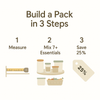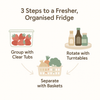A Non-Muslim’s Guide to Ramadan: Understanding the Holy Month & Its Meaning

A Non-Muslim’s Guide to Ramadan: Understanding the Holy Month & Its Meaning
Ramadan is one of the most significant months in Islam, observed by millions of Muslims worldwide. If you have Muslim friends, colleagues, or neighbours, you may have heard about fasting, iftar, or the importance of this sacred month. But what exactly is Ramadan, and why is it observed?
This guide is designed for non-Muslims who want to understand the meaning, traditions, and etiquette of Ramadan—along with some practical ways to show respect and support.
What is Ramadan? 🌙
Ramadan is the ninth month of the Islamic lunar calendar and is considered the holiest month for Muslims. It is a time of fasting, prayer, self-reflection, and increased charity. The exact dates change each year based on the lunar cycle, but it typically lasts 29 or 30 days.
Key aspects of Ramadan include:
✔️ Fasting (Sawm): From sunrise (Suhoor) to sunset (Iftar), Muslims abstain from food, drink (including water), and other physical needs.
✔️ Increased Prayer: Muslims engage in extra prayers, especially the Taraweeh prayers at night.
✔️ Charity (Zakat & Sadaqah): Giving to those in need is a major part of Ramadan.
✔️ Spiritual Reflection: Ramadan encourages mindfulness, gratitude, and strengthening one’s faith.
At sunset, families and communities come together to break their fast with a meal called Iftar, often starting with dates and water.
Why Do Muslims Fast? 🕌
Fasting during Ramadan is one of the Five Pillars of Islam and is seen as a way to:
✔️ Develop self-discipline and gratitude
✔️ Strengthen spiritual connection and focus on prayer
✔️ Encourage compassion for those who are less fortunate
✔️ Purify the body and mind from distractions
Fasting is not obligatory for everyone—those who are sick, elderly, pregnant, travelling, or have medical conditions are exempt.
Common Ramadan Traditions
- Suhoor (Pre-Dawn Meal): The meal before fasting begins at sunrise. Many prefer nutritious foods that provide energy throughout the day.
- Iftar (Breaking Fast at Sunset): The evening meal that traditionally starts with dates and water, followed by a full meal.
- Taraweeh (Night Prayers): Special prayers performed in congregation at mosques after Iftar.
- The Last 10 Days: The final nights of Ramadan are considered the most sacred, with increased prayer and devotion.
How to Respect & Support Muslim Friends During Ramadan 🤝
If you work with, live near, or have friends who are observing Ramadan, here are some thoughtful ways to show respect:
✔️ Be Mindful of Fasting: Avoid offering food or drinks during fasting hours, especially in shared workspaces.
✔️ Greet with "Ramadan Mubarak" or "Ramadan Kareem": These phrases mean "Blessed Ramadan" or "Have a generous Ramadan."
✔️ Understand Schedule Adjustments: Many Muslims may wake up before sunrise for Suhoor and stay up late for prayers, so be understanding of changes in energy levels.
✔️ Join an Iftar Meal: If invited, attending an Iftar meal is a great way to experience the traditions and hospitality of Ramadan.
✔️ Support Charitable Causes: Ramadan is a time of giving, so consider donating to a food bank or charity in honour of the spirit of the month.
Staying Organised During Ramadan 🏡
Ramadan comes with a unique daily routine, making organisation especially important. Many Muslim households prepare in advance to ensure they have everything they need for Suhoor, Iftar, and daily prayers.
Here’s how storage solutions can help during the month:
✔️ Pantry Organisation: Using bamboo glass jars to store dates, rice, lentils, and spices helps keep ingredients fresh and accessible.
✔️ Fridge Organisation: Clear fridge storage organisers help separate Suhoor essentials like yogurt, eggs, and drinks for easy morning access.
✔️ Prayer Area Setup: Keeping a dedicated space tidy with storage baskets for prayer mats, books, and other essentials ensures a peaceful environment.
✔️ Meal Prep & Leftovers: Airtight containers make it easy to store and reheat leftovers for Suhoor or the next day's Iftar.
What Happens After Ramadan? 🎉
The end of Ramadan is marked by Eid al-Fitr, a joyous celebration that begins with a special prayer at the mosque, followed by feasting, visiting family and friends, and exchanging gifts. It is a day of gratitude, generosity, and celebration.
Final Thoughts: A Month of Reflection and Community
Ramadan is a deeply meaningful time for Muslims, focusing on faith, gratitude, and giving back. Whether you’re curious to learn more or simply want to be respectful and supportive, understanding the significance of Ramadan is a great step in fostering inclusivity and cultural awareness.
Wishing everyone observing Ramadan a peaceful and blessed month! 🌙✨





